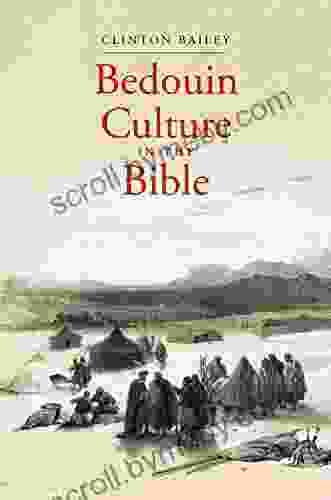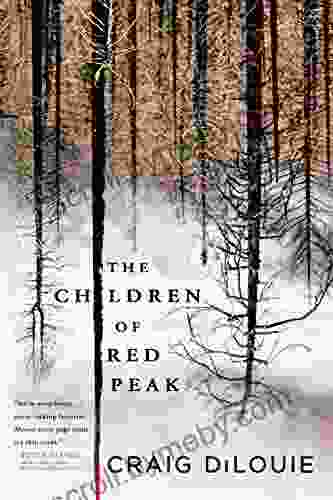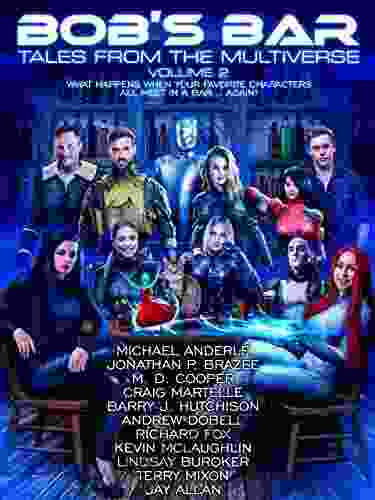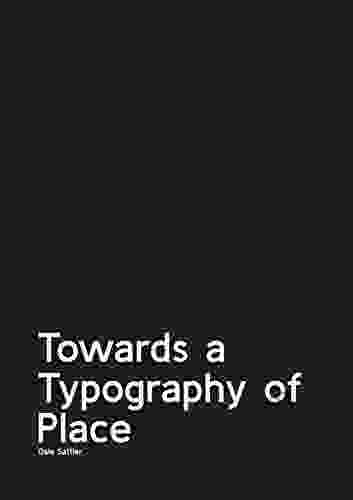Unveiling the Enigmatic Bedouin Culture through the Lens of the Bible

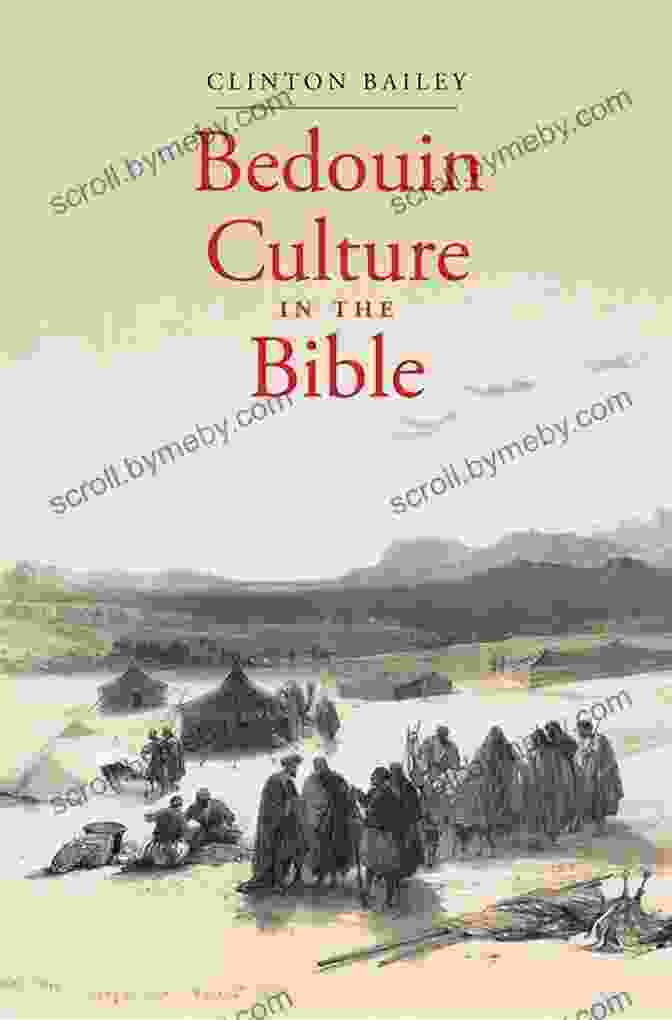
The ancient nomadic Bedouin culture, with its rich tapestry of traditions, beliefs, and customs, has left an enduring imprint on the pages of the Bible. From the patriarchs to the prophets, the lives of countless biblical figures were intertwined with the enigmatic ways of the desert dwellers. Through their encounters with the Bedouin, the biblical writers gained invaluable insights into the complexities of human nature and the profound truths of faith.
4.8 out of 5
| Language | : | English |
| File size | : | 8872 KB |
| Text-to-Speech | : | Enabled |
| Screen Reader | : | Supported |
| Enhanced typesetting | : | Enabled |
| Word Wise | : | Enabled |
| Print length | : | 288 pages |
In this captivating book, "Bedouin Culture in the Bible," we embark on an extraordinary journey to explore the vibrant and multifaceted world of the Bedouin. Drawing upon extensive research and firsthand accounts, this meticulously crafted work delves into the customs, beliefs, and traditions of the Bedouin, illuminating their relevance within the biblical narrative.
The Patriarchs and the Bedouin
The patriarchs of the Bible, Abraham, Isaac, and Jacob, were intimately connected with the Bedouin way of life. As nomadic shepherds, they roamed the vast deserts of the Middle East, their lives shaped by the challenges of the arid environment. Through their interactions with the Bedouin, the patriarchs learned invaluable lessons about hospitality, loyalty, and the importance of family ties.
One of the most poignant examples of the Bedouin influence on the patriarchs is the story of Hagar, Sarah's Egyptian handmaid. When Sarah became jealous of Hagar and her son, Ishmael, she banished them from her home. As Hagar and Ishmael wandered into the desert, they encountered disaster. Ishmael was dying of thirst, and Hagar was at her wit's end. Just when all hope seemed lost, an angel of God appeared to Hagar, providing her with a well of water.
This encounter with the divine in the desert is a powerful testament to the Bedouin belief in the power of hospitality and the sanctity of life. It also highlights the importance of accepting and embracing strangers, even those who come from different backgrounds or traditions.
The Wilderness Wanderings and the Bedouin
The wilderness wanderings of the Israelites, after their liberation from slavery in Egypt, were a time of both great hardship and profound spiritual growth. During their travels through the unforgiving desert, the Israelites had numerous encounters with the Bedouin, learning essential survival skills and deepening their understanding of God's providence.
The Bedouin's knowledge of the desert's terrain and their ability to navigate its treacherous conditions proved invaluable to the Israelites. They guided the wanderers through unmarked paths, providing them with provisions and protection. Through these interactions, the Israelites witnessed firsthand the remarkable resilience and adaptability of the Bedouin, qualities that would serve them well in the challenges ahead.
Moreover, the wilderness wanderings provided a unique opportunity for spiritual reflection and growth. In the vast emptiness of the desert, the Israelites were stripped of their worldly possessions and forced to rely solely on God's sustenance. This experience taught them the importance of trust and obedience, virtues that would become the cornerstone of their faith.
The Prophets and the Bedouin
The prophets of the Old Testament, from Moses to Elijah and Jeremiah, were often inspired by the Bedouin culture and its values. They drew upon the Bedouin's deep understanding of the natural world and their reverence for divine revelation.
The prophet Isaiah, for example, frequently used the imagery of the desert and its inhabitants in his prophecies. He compared the Israelites to a "thirsty land" that longs for the refreshing waters of God's grace (Isaiah 35). He also likened the blessings of the messianic age to a "wilderness that shall blossom like the rose" (Isaiah 35:1).
The prophet Amos, too, was influenced by the Bedouin way of life. He denounced the injustice and oppression that plagued his society, comparing the corrupt leaders to "thirsty dogs" (Amos 8:13). Through his powerful preaching, Amos called for a return to the core values of Bedouin culture, emphasizing the importance of hospitality, justice, and compassion.
The Bedouin culture has played a profound role in shaping the narrative and spiritual themes of the Bible. Through their encounters with the Bedouin, biblical figures learned invaluable lessons about hospitality, loyalty, survival, and faith. The customs, beliefs, and traditions of the Bedouin provided a rich tapestry upon which the biblical writers wove their stories, creating a timeless tapestry of human experience and divine revelation.
By exploring the multifaceted world of Bedouin culture, we gain a deeper understanding of the biblical text and the enduring significance of its message. "Bedouin Culture in the Bible" is an indispensable resource for scholars, theologians, and anyone seeking to uncover the timeless wisdom and beauty of the ancient Middle East.
4.8 out of 5
| Language | : | English |
| File size | : | 8872 KB |
| Text-to-Speech | : | Enabled |
| Screen Reader | : | Supported |
| Enhanced typesetting | : | Enabled |
| Word Wise | : | Enabled |
| Print length | : | 288 pages |
Do you want to contribute by writing guest posts on this blog?
Please contact us and send us a resume of previous articles that you have written.
 Book
Book Novel
Novel Page
Page Chapter
Chapter Text
Text Story
Story Genre
Genre Reader
Reader Library
Library Paperback
Paperback E-book
E-book Magazine
Magazine Newspaper
Newspaper Paragraph
Paragraph Sentence
Sentence Bookmark
Bookmark Shelf
Shelf Glossary
Glossary Bibliography
Bibliography Foreword
Foreword Preface
Preface Synopsis
Synopsis Annotation
Annotation Footnote
Footnote Manuscript
Manuscript Scroll
Scroll Codex
Codex Tome
Tome Bestseller
Bestseller Classics
Classics Library card
Library card Narrative
Narrative Biography
Biography Autobiography
Autobiography Memoir
Memoir Reference
Reference Encyclopedia
Encyclopedia Courtney Maum
Courtney Maum Elizibeth Lopes
Elizibeth Lopes D Bruce Means
D Bruce Means Liane Moriarty
Liane Moriarty Dale Merrill
Dale Merrill Stephen Michael Shearer
Stephen Michael Shearer Craig Murray
Craig Murray Steve Talbot
Steve Talbot Joseph Luzzi
Joseph Luzzi Viajo Logo Existo
Viajo Logo Existo Clyde D Souza
Clyde D Souza Colin Bryar
Colin Bryar David H Sandler
David H Sandler Colin Valentine
Colin Valentine Egerton Ryerson Young
Egerton Ryerson Young D Arcy Greig
D Arcy Greig Laurence Gardner
Laurence Gardner Condoleezza Rice
Condoleezza Rice James Qeqe
James Qeqe Joe Todd Stanton
Joe Todd Stanton
Light bulbAdvertise smarter! Our strategic ad space ensures maximum exposure. Reserve your spot today!

 Jedidiah HayesOliver Bulleid Locomotives: A Comprehensive Guide to the Masterpieces of...
Jedidiah HayesOliver Bulleid Locomotives: A Comprehensive Guide to the Masterpieces of... Alex FosterFollow ·14.5k
Alex FosterFollow ·14.5k Forrest BlairFollow ·13.2k
Forrest BlairFollow ·13.2k Arthur MasonFollow ·16k
Arthur MasonFollow ·16k Marcel ProustFollow ·11.1k
Marcel ProustFollow ·11.1k Jared NelsonFollow ·8.3k
Jared NelsonFollow ·8.3k Frank ButlerFollow ·4.4k
Frank ButlerFollow ·4.4k Geoffrey BlairFollow ·9.4k
Geoffrey BlairFollow ·9.4k Milton BellFollow ·12.2k
Milton BellFollow ·12.2k

 Cruz Simmons
Cruz SimmonsUnveiling the Secrets: An Insider Guide to School Bonds...
Unlock the Power of School...
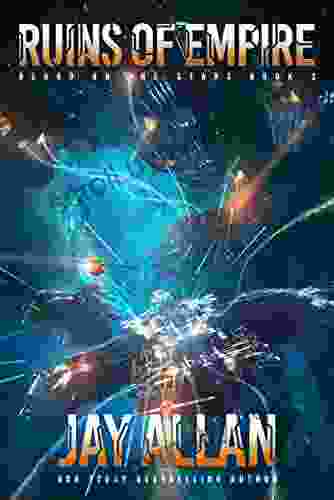
 Gil Turner
Gil TurnerRuins of Empire: Blood on the Stars - The Epic Space...
Ruins of Empire: Blood on the Stars is the...

 Allen Ginsberg
Allen GinsbergPrepare for the Ultimate Space Opera: Delve into The Last...
Embark on an...

 Anton Foster
Anton FosterUnleash Your Inner Artist: The Ultimate Guide to Oil...
Chapter 1: The...
4.8 out of 5
| Language | : | English |
| File size | : | 8872 KB |
| Text-to-Speech | : | Enabled |
| Screen Reader | : | Supported |
| Enhanced typesetting | : | Enabled |
| Word Wise | : | Enabled |
| Print length | : | 288 pages |


